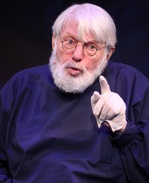SITE GUIDE
SEARCH
REVIEWS
REVIEW ARCHIVES
ADVERTISING AT CURTAINUP
FEATURES
NEWS
Etcetera and
Short Term Listings
LISTINGS
Broadway
Off-Broadway
NYC Restaurants
BOOKS and CDs
OTHER PLACES
Berkshires
London
California
New Jersey
DC
Connecticut
Philadelphia
Elsewhere
QUOTES
TKTS
PLAYWRIGHTS' ALBUMS
LETTERS TO EDITOR
FILM
LINKS
MISCELLANEOUS
Free Updates
Masthead
A CurtainUp Review
Sholom Aleichem: Laughter Through Tears
|
I came to America because I thought this was a place where Jews could have a life.— Sholom Aleichem
|

Theodore Bikel
(Photo: Michael Priest) |
Theodore Bikel is an actor and folksinger who was born in Vienna but began his career in Palestine where his parents immigrated after the Nazis occupied Austria. Although he originated the role of Baron von Trapp in The Sound of Music on Broadway and has been featured in films from The African Queen to The Russians Are Coming, Bikel is perhaps bst known as Tevye, a role he has played over 2,000 times since 1967. What better combination for Sholom Aleichem: Laughter Through Tears, a play with music celebrating the great Yiddish writer?
Bikel, who also wrote this show, walks onto the stage dressed like a Russian peasant. He plays himself, Sholom Aleichem, various characters in the writer's youth back in Russia and the characters he created. He sings the sweet, ironic, sentimental Yiddish folksongs that may soon fade from a distant memory to the forgotten. And he does so with love and tenderness.
Although Sholom Aleichem lived at a time when the destiny of Jews was most precarious (a time, however, when no one could predict the horrors of the Holocaust), his personal and fictional stories are filled with hope and humor. In fact, during his life he was known as the Yiddish Mark Twain. (Mark Twain, however, referred to himself as the American Sholom Aleichem.)
Sholom Aleichem: Laughter Through Tears traces Aleichem's inspiration back to his step grandmother. The play follows his career in Europe as well as the United States, where he is amazed at how Jews have lost their values and become consumed by consumerism, valuing money and material goods over religion and learning. A high spot is when Bikel reprises his role of Tevye, only this time in the original Sholom Aleichem version. Thankfully, he sings no songs from Fiddler on the Roof.
Bikel, who is 85, is still vigorous and magnetic. His voice is warm, rich and powerful. He sings (in both Yiddish and English) classic Yiddish songs such as "Ver Vet Blaybn" (Who Will Remain)," Di Mezinke" (Our Youngest is Married) and the wonderful lullaby "Oyfn Pripetshik", whose comforting melody has soothed many a Jewish child to sleep — all with great feeling and familiarity.
Visiting the Lower East Side today, it's hard to remember that once this section of New York City was a thriving center of Yiddish theater and culture. As Bikel says, "Shakespeare was done in Yiddish on Second Avenue before it was done uptown in English." And of all the writers whose work was staged on Second Avenue (the Broadway of the Lower East Side) none was more beloved than Sholom Aleichem.
Many people believe Yiddish theater is dead today, but as Stefan Kanfer points out in Stardust Lost: The Triumph, Tragedy, and Meshugas of the Yiddish Theater in America, "Among the Yiddish theater's graduates and associates were actors Paul Muni, John Garfield, Zero Mostel, Walter Matthau, the acting teachers Lee Strasberg and Sanford Meisner, the playwrights Clifford Odets and Ben Hecht, the directors Harold Clurman and Sidney Lumet, and the stage designer Boris Aronson. The Yiddish theater was their university, and when they left the ghetto and went out into the world, they altered whatever they touched." As Sholom Aleichem says, "Does anybody worry about legacy? People under 60 usually don't." Yet, as Kanfer concludes, since the heyday of Yiddish theater, "neither Broadway nor Hollywood has been the same. . ."
Sholom Aleichem: Laughter Through Tears was created in loving memory.
|
Sholom Aleichem: Laughter Through Tears Folksbiene at Baruch Performing Arts Center, 55 Lexington Avenue 646/312-5073www.folksbiene.org Written and performed by Theodore Bikel Directed by Derek Goldman Musical Director and Pianist: Tamara Brooks Scenic Design: Robbie Hayes Costume Design: Gail Cooper-Hecht Lighting Design: Dan Covey Sound Design: Don Jacobs Projections Design: Zachary Borovay Running Time: Approx. 90 minutes, with an intermission From 11/08/09; opening 11/17/09; closing 12/13/09 Tuesdays & Wednesdays at 2pm; Thursdays at 2pm & 8pm; Saturdays at 8pm and Sundays at 2pm & 6pm, with special performances on Fridays November 27 and December 4, both at 12 noon Tickets, $55 and $45 Reviewed by Paulanne Simmons Nov. 14, 2009 |
|
REVIEW FEEDBACK Highlight one of the responses below and click "copy" or"CTRL+C"
Paste the highlighted text into the subject line (CTRL+ V): Feel free to add detailed comments in the body of the email. . .also the names and emails of any friends to whom you'd like us to forward a copy of this review. You can also contact us at Curtainup at Facebook or Curtainup at Twitter |
|
Subscribe to our FREE email updates with a note from editor Elyse Sommer about additions to the website -- with main page hot links to the latest features posted at our numerous locations. To subscribe,
E-mail: esommer@curtainup.comesommer@curtainup.com
put SUBSCRIBE CURTAINUP EMAIL UPDATE in the subject line and your full name and email address in the body of the message -- if you can spare a minute, tell us how you came to CurtainUp and from what part of the country. |






